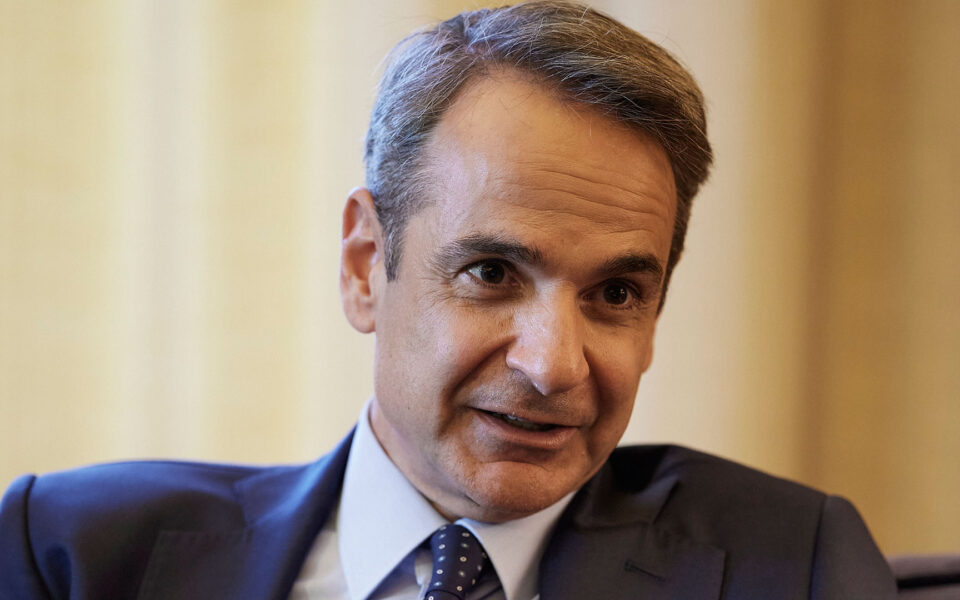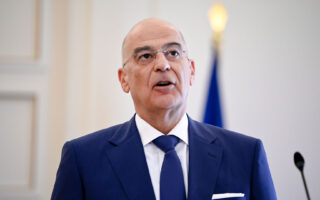Mitsotakis on CNN: Europe cannot rely only on US for defense

Prime Minister Kyriakos Mitsotakis has welcomed the “clear commitment” by all NATO member states to commit to spending at least 2% of GDP on defense spending, adding that European countries cannot “just rely” on the US for their defense.
“Greece has been doing that for many, many years, and I am happy to see that other countries, which over the past years have clearly not spent as much as they should on defense, are clearly catching up,” he said in an wide-ranging interview with CNN anchor Julia Chatterley.
The prime minister said increased defense spending was an important issue for “us Europeans because we cannot just rely on the US for our own defense because we also need to spend more as Europe.”
“We have to spend at least 2% and maybe 2% is not enough in this changing geopolitical landscape.”
Prime Minister @kmitsotakis of #Greece discusses Trump-proofing #NATO, how to protect tourists amid climate change, plus debunking reports of a blanket 6-day work week! pic.twitter.com/vJkQO85d34
— Julia Chatterley (@jchatterleyCNN) July 12, 2024
He added that “maybe 2% is not enough in this changing geopolitical landscape,” referring to Ukraine. Europe will need to consider a “European defense facility that will compliment our financial firepower with more European money,” referring to the proposal he has made with Polish Prime Minister Donald Tusk to create a “iron dome” or common European anti-aircraft shield.
Asked to comment on the concerns expressed about the suitability of Joe Biden to stand for re-election as US president, Mitsotakis replied that “while he understood the interest in the topic, I am not going to jump into it for obvious reasons.”
Biden had a marked presence at the summit and “spoke eloquently on important topics” but the US election is an issue for US citizens, he said.
He said he was not in the room when Biden confused Ukrainian Prime Minister Volodymyr Zelenskyy with Russian President Vladimir Putin, only to correct himself immediately, saying he understood the confusion over such incidents that can happen.
Regarding Ukraine, Mitsotakis pointed out that it was clear in the context of the meeting that the country’s NATO integration path is “irreversible”, as is the support provided by the member countries, bilaterally and within the framework of the alliance.
Regarding the rise of the far-right at the European level, Mitsotakis underlined that the centrist parties have a majority in the European Parliament, which will also be confirmed by the election of Ursula von der Leyen for a new term in the European Commission.
He added that fears of the rise of the extreme right at the European level may be exaggerated.
While he acknowledged the reasons why citizens turn to such parties, such as their concern about the rising cost of living, or immigration, these parties offer simplistic solutions to such problems.
Turning to tourism and whether Greece and the environment can withstand an influx of tourists that represents three times its population, Mitsotakis said that people who visit Greece have a good time, which is why they come back.
“But it is our obligation to ensure that our tourism industry is protected against climate change and one of our main priorities is to spread out the tourist season in order for not all tourists show up on our islands in July and August,” he said, rejecting the argument that Greece has an overtourism problem.
Regarding the headlines in foreign media about the establishment of a “six-day work” in Greece, Mitsotakis said that “it is a myth” that Greece has such a regime. Only a small number of industries that operate around the clock may operate employees a six-day working week but only with the agreement of the employee and with significant additional pay.
“We have one of the most sophisticated and modern labor protection systems in Europe,” he said.





